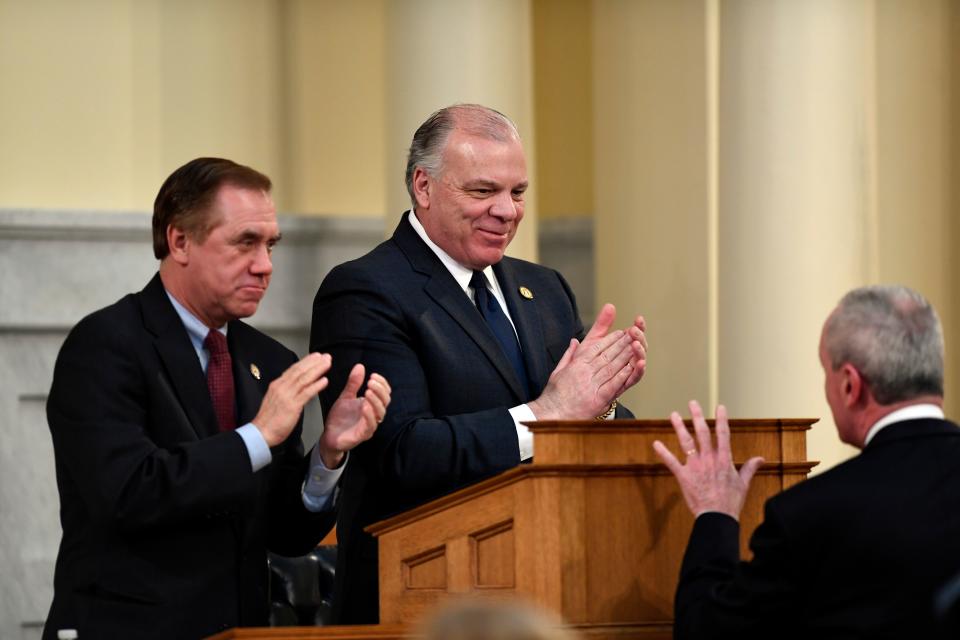Can Steve Sweeney make the big lift needed for 2025? NJ Dems will have to decide | Stile
- Oops!Something went wrong.Please try again later.
Steve Sweeney, the burly ironworker who became New Jersey's longest-serving state Senate president, was at the nerve center of Statehouse power for the past two decades.
Yet the 64-year-old Gloucester County Democrat, now an official candidate for governor in 2025, offers a blunt assessment of New Jersey government — a government, by the way, he had a significant role in shaping over the past 20 years:
It's broken.
"New Jersey is an unbelievably great place to live," Sweeney said in an interview Wednesday. "And government just screwed it up. And we've got to fix it."

Sweeney has spent much of the past two years in an unplanned exile, after his stunning defeat in 2021 to an unknown and unfinanced truck driver, Ed Durr. Since then, he launched the Steve Sweeney Institute for Public Policy, which has offered a blunt warning about New Jersey's troubling finances. He fashions himself, to some degree, as a blue-collar policy wonk.
Today, I’m announcing my run for New Jersey governor.
I was a union ironworker for years and became a public servant after my daughter was born with Down Syndrome.
She was the spark, inspiring me to fight for a better NJ.
Watch my announcement video⬇️https://t.co/erPot2m90R— Steve Sweeney (@SteveSweeney_NJ) December 11, 2023
Can Sweeney convince NJ Democrats he's the choice?
But as he prepares a comeback from political oblivion, his verdict also underscores the complicated challenge he faces as he tries to persuade more than 2 million New Jersey Democrats that he should be the party's next standard-bearer for governor.
Sweeney's tenure in Trenton coincided with a near doubling of the size of state government spending. He was part of a Legislature that, when it was convenient, looked the other way when it came to skipping the annual pension payments. But Sweeney also thrust himself into cost-cutting fights where few Democrats have dared to go — sometimes in close collaboration with the deeply unpopular Gov. Chris Christie.
He's a hard-hat union leader who tangled with public employee unions. Sweeney is a champion of smaller government. He resisted tax increases on the wealthiest — but also supported them at times.
Sweeney has won admirers for his bold plunge down a path of government cost-cutting. Many say it is needed in a state that has long neglected its fundamental needs — from restoring its hobbled transit system to its chronically underfunded higher education. But his advocacy has made him a pariah with some of the more powerful public employee unions, which hold significant sway in a Democratic Party primary.
And Sweeney's pledge to be New Jersey's next Mr. Fix-It — a pragmatic, across-the-aisle consensus builder who is not afraid to negotiate and solve with people who just tried to destroy his career (Read: New Jersey Education Association, the state's largest teachers' union) — comes amid a crosscurrent of change swirling on the immediate horizon.
For one thing, New Jersey voters often select a governor from the opposite party after a two-term office holder (the exception in the post-World War II era was Democrat Richard J. Hughes after the two terms of Democrat Robert Meyner in the 1950s). The current governor, Phil Murphy, is the first two-term Democrat elected in half a century.
That could make Sweeney a hard sell among the party primary voters looking for a change-agent candidate to counter a Republican nominee.
Then there is also the coalition of antagonism arrayed against Sweeney. The public employee unions that he battled for years have strong influence in the primaries.
And progressive groups, who view first lady Tammy Murphy’s coronation last month for the U.S. Senate nomination as an example of a party system rigged by lobbyists and bosses, have openly battled Sweeney over the years as a pillar of that very system. Sweeney is, after all, a childhood friend and close political ally of the South Jersey party power broker George E. Norcross III.
A poll that took stock of the early field for the 2025 race offered a glimpse of Sweeney’s challenge. It found that he enjoyed the highest name recognition among voters — nearly 55% knew of Sweeney, which is pretty impressive for a legislative leader, usually not a household name.
Still, the Fairleigh Dickinson/Public Mind survey, taken last February, showed Sweeney with 19% of Democrats viewing him favorably and 16% unfavorably, the highest unfavorable rating of the names in the poll, which included Rep. Mikie Sherrill, D-Montclair, Jersey City Mayor Steve Fulop, Newark Mayor Ras Baraka, and former Lt. Gov. Sheila Oliver, who died in June. Sweeney’s favorability rating worsened when his name was included with possible Republican contenders.
“There's a lot of people, especially on the progressive side, who are kind of reflexively against anybody who was in the institutional Democratic Party," said Dan Cassino, the poll director. "And I think that's probably what's driving some of this. It’s like ‘Oh, I've heard of this guy as a Democratic statewide [figure] in New Jersey for a long time. OK, so that tells me he's one of the guys I don't like, working with the machine.'”
The field grows: Steve Sweeney, former NJ state Senate president, announces 2025 run for governor
Sweeney stands by his record — much of it progressive
Yet Sweeney says that Democratic Party machine rap fails to take into consideration his long record of shepherding through some of the landmark progressive legislation in New Jersey over the last two decades, such as enacting paid family leave, increasing the minimum wage, requiring employers to provide 40 hours of earned sick leave, bolstering pay equity for women, restoring funding for women’s health clinics, and ending non-disclosure agreements for victims of sexual harassment.
Much of Murphy’s progressive agenda would not have been possible without Sweeney’s commitment and political muscle.

Former state Sen. Loretta Weinberg of Teaneck, the Legislature’s leading champion of liberal causes, who served with Sweeney as part of his leadership team, said he was instrumental in guiding some of her more politically sensitive bills through the more socially conservative South Jersey delegation. She said she remains “mystified” why some of her more progressive allies never gave Sweeney the proper credit for his work.
“I never felt like I had to sell him on the righteousness of the issue," Weinberg said. “He always understood it.”
Charlie Stile: The Senate Ethics Committee hasn't moved on Bob Menendez. This may be why
Yet Sweeney operates from the center-right of the party. His pragmatism and his ability to notice the political ground shifting under his feet are his defining features. In 2010, he doomed the passage of the same sex marriage bill by abstaining on the vote. A year later, he took to the Senate floor and apologized. Years later, he oversaw legislation codifying the practice into law.
He was a staunch supporter of gun rights, opposing legislation in 2014 that lowered the size of ammunition magazines. But he changed positions after meeting with family members of the victims of the Sandy Hook Elementary School massacre. His switch angered the Second Amendment activists, although it never entirely won over champions of gun control, either.
(1,2) One of the best relationships to come out of the shooting is my relationship with @PhilMurphy. I was proud to fight against @SteveSweeney_NJ & his efforts to block sensible reforms. I look forward to doing everything possible to ensure he loses. https://t.co/L02jWl9Le6
— Fred Guttenberg (@fred_guttenberg) December 11, 2023
He incurred the wrath of Fred Guttenberg, the father of a victim of the Parkland, Florida, high school shooting, for balking at some of Murphy’s plan in 2018 to raise licensing fees for selling firearms. And Sweeney blocked Murphy’s push to raise taxes on millionaires but eventually relented.
“I’m not trying to pretend to be anything but a moderate," Sweeney said. “A moderate Democrat can win an election in 2025. We’re losing a lot of Democrats that just think a Democratic Party is going too far to the left.”
Sweeney, a former Gloucester County freeholder (the office is now called commissioner), has also been one of the few Democrats who advocated a shrinking of government, which cuts against the grain of the party establishment. He authored a “Path to Progress” platform while in office, which called for school regionalization.
And the Sweeney Policy Institute, at Rowan University, made waves this year by warning that the state is facing a potential cataclysmic crash in revenue in the next few years. And that forecast did not include the cost of the generous “StayNJ” rebate plan for seniors proposed for a 2026 launch.
“Promising people the moon and the stars when you can't afford to take a ride around the block?’’ he said. “We're facing some tough times."
Charlie Stile: These are the political missteps that merit NJ political turkeys for 2023
Can shifting Democratic influence and leadership create obstacles?
But Sweeney’s biggest challenge may not be the progressives, but the very institutional wing of the party, from which he rose to power as Senate president in 2009. Sweeney’s stunning loss in 2021 capped a series of setbacks for Norcross’ South Jersey political machine. Losing Sweeney was a major blow, and earlier this year, Norcross indicated that he was receding from politics.
While South Jersey staged an impressive comeback last month, with Democrats clawing back some of the turf they lost two years earlier, the power in the Statehouse has since shifted to Middlesex, Union and Essex counties. Some of those leaders, who chafed at South Jersey’s iron grip when Sweeney and Christie ran the agenda in Trenton, are not eager to let one of Norcross’ most reliable allies become one of the nation's most powerful governors.
Sweeney, for his part, downplays the potential influence of Norcross.
"He's George and I'm Steve," he said. "I'm not going to deny his friendship. He's my friend. But I'm my own person."
In an interview with Politico earlier this year, Norcross said that if Sweeney runs, "I will do whatever he asks me to do."
North and Central Jersey party leaders are likely to back other candidates from North Jersey for the 2025 nominee, including Fulop, who has already entered the race; Rep. Josh Gottheimer, D-Wyckoff, and Baraka.
Yet the crowded, fragmented field might just work to Sweeney’s advantage. He has already consolidated the leadership of six South Jersey counties, representing close to 20% of the Democratic electorate, and a laundry list of South Jersey legislators.
And while public employee unions may prove cool to him, Sweeney has ardent support from the building trades. If powerful party leaders line up behind a Gottheimer or a Fulop or a Sherrill, Sweeney might just have enough to seize the prize.
“If they're all pushing their own candidates, then that's the path by which the South Jersey 20 or 25% [of the vote] can be victorious," said Micah Rasmussen, director of the Rebovich Institute for New Jersey Politics at Rider University.
Sweeney, a former bouncer, was once capable of bench-pressing 400 pounds. Winning the 2025 Democratic nomination is possible. But its going to be a heavy lift.
Charlie Stile is a veteran New Jersey political columnist. For unlimited access to his unique insights into New Jersey’s political power structure and his powerful watchdog work, please subscribe or activate your digital account today.
Email: stile@northjersey.com
This article originally appeared on NorthJersey.com: Steve Sweeney for NJ governor 2025: Can he pull it off?

